| DOING YOUR HOMEWORK |
A reputable breeder
...will take the puppy back if the owners can't keep it.
...breeds for the betterment of the breed, not for making money. For the betterment
of the breed means breeding to the AKC standard, using healthy breeding dogs,
proving them in some area (show ring, working, performance events like obedience
and agility), and trying to breed for that elusive 'perfect dog'. Betterment of the breed
is not breeding for a particular size, for long hair, or for a certain color.
...will often be a member of the national breed club (Alaskan Malamute Club of
America) and/or their local breed club. They will care about the future of the breed
as a whole.
...will not mind you asking for references.
...permanently identifies their puppies before they leave or provides some means for
that to happen when appropriate.
...will have done at least the minimum health clearances (in malamutes, Hips, Eyes,
and polyneuropathy except as mentioned above).
...will be there for their puppy people if they have questions or problems. They will
be particularly interested in any health problems that arise.
...will not necessarily have you over to their house but should have pictures and
maybe even video of the parents. Sadly, there have been cases of breeders being
killed or their dogs hurt by sick individuals coming to their house on the premise of
'looking at a puppy' and it's becoming more common for breeders to not want
strangers over to the house. It wouldn't be out of line to expect see some of the dogs
at a local dog show, other event, or park where both parties can feel safe. You may
also only be able to meet the mother depending upon where the sire lives or in the
case of an artificial insemination the sire might be long gone.
...will often but not always have a waiting list. They get a good reputation and people
want their dogs. They don't have a lot of litters so the demand is usually greater than
the "supply". Be patient.
...will keep the puppies until they are at least 8 weeks to ensure the puppy has had the
appropriate socialization time with the siblings, mother, and often other
puppy-appropriate dogs in the home.
...willl often select the puppy for you. They have lived with the puppies for at least 8
weeks and know the personalities of the puppies. They have considered the needs of
you and your family and have properly matched a puppy. The puppy who runs up to
you when you visit to 'choose' you probably 'chose' the last people who visited. And
the last people before that. That puppy may also have very high energy and be an
inappropriate choice for your home. And the smart puppy who gets into trouble is
probably also an inappropriate choice for your home. Trust the breeder's experience
to get you the dog you need.
...will send puppies home with AKC papers (or apply for individual registration once
you've picked a name), with first vaccines and deworming (including a record of when
it was done), pedigree, a copy of your contract and guarantees, some food to help
with the transition unless they're raw fed, and hopefully some photos of the pup
and/or parents.
Do not settle for anything less!
...will take the puppy back if the owners can't keep it.
...breeds for the betterment of the breed, not for making money. For the betterment
of the breed means breeding to the AKC standard, using healthy breeding dogs,
proving them in some area (show ring, working, performance events like obedience
and agility), and trying to breed for that elusive 'perfect dog'. Betterment of the breed
is not breeding for a particular size, for long hair, or for a certain color.
...will often be a member of the national breed club (Alaskan Malamute Club of
America) and/or their local breed club. They will care about the future of the breed
as a whole.
...will not mind you asking for references.
...permanently identifies their puppies before they leave or provides some means for
that to happen when appropriate.
...will have done at least the minimum health clearances (in malamutes, Hips, Eyes,
and polyneuropathy except as mentioned above).
...will be there for their puppy people if they have questions or problems. They will
be particularly interested in any health problems that arise.
...will not necessarily have you over to their house but should have pictures and
maybe even video of the parents. Sadly, there have been cases of breeders being
killed or their dogs hurt by sick individuals coming to their house on the premise of
'looking at a puppy' and it's becoming more common for breeders to not want
strangers over to the house. It wouldn't be out of line to expect see some of the dogs
at a local dog show, other event, or park where both parties can feel safe. You may
also only be able to meet the mother depending upon where the sire lives or in the
case of an artificial insemination the sire might be long gone.
...will often but not always have a waiting list. They get a good reputation and people
want their dogs. They don't have a lot of litters so the demand is usually greater than
the "supply". Be patient.
...will keep the puppies until they are at least 8 weeks to ensure the puppy has had the
appropriate socialization time with the siblings, mother, and often other
puppy-appropriate dogs in the home.
...willl often select the puppy for you. They have lived with the puppies for at least 8
weeks and know the personalities of the puppies. They have considered the needs of
you and your family and have properly matched a puppy. The puppy who runs up to
you when you visit to 'choose' you probably 'chose' the last people who visited. And
the last people before that. That puppy may also have very high energy and be an
inappropriate choice for your home. And the smart puppy who gets into trouble is
probably also an inappropriate choice for your home. Trust the breeder's experience
to get you the dog you need.
...will send puppies home with AKC papers (or apply for individual registration once
you've picked a name), with first vaccines and deworming (including a record of when
it was done), pedigree, a copy of your contract and guarantees, some food to help
with the transition unless they're raw fed, and hopefully some photos of the pup
and/or parents.
Do not settle for anything less!
Decoding websites
* Avoid anyone saying they have 'rare' anything. Red malamutes are not rare,
neither are white malamutes. Long coats are not rare either, in fact, they're quite
common because it's a simple recessive that most of us breed away from. They make
excellent pets but they do not do well on sled teams. They should NEVER have blue
eyes as Malamutes DO NOT carry the blue eyed gene. There are terms like
"throwback" and "rare mutation" that people say to explain away that their dogs are
not purebred. "Rare" = gimmick to sell puppies for $$$.
* Look at the condition of the dogs in the photographs. Are they cleaned? Well
groomed? Do they look healthy or are their coats looking a bit dull? Dull coats can
indicate thyroid problems, parasites, or dirty conditions. Coat is one of the first
indicators that there is a problem. How are they kept? Do the dogs look healthy or
are they scrawny and lack definition to their bodies? Are they fat and their stomachs
hang? Do they look happy? The occasional cute picture of a muddy dog caught
digging is fine, most of the pictures on the website showing dirty dogs is not.
* Is a pedigree listed? Or is it just 'champion pedigree' or a couple famous kennels
listed? The 'champion' pedigree simply means there are champions somewhere in the
pedigree....big deal, most, if not all purebred malamutes go back to champions
'somewhere'. Commonly disreputables will list a few famous kennels that appear
behind their dogs, often it's one or two dogs in the 5th or 6th generation of the
pedigree. Again, big deal, that's common in most dogs. It's not a sign of quality.
* Be leery of sites listing their methods of payment and prices and offer some sort of a
'purchase' button. Reputable breeders want to talk to you and figure out if you're a
suitable home for one of their dogs before entering into a transaction with you.
* How often are their dogs being bred? The girls should not have more than one litter
per year, they should not be bred before 18 months and they should be retired from
breeding at a reasonable age--around 7-8 years old. The ONE exception to the
back-to-back litters rule is if one is using frozen semen. Reputable breeders will
sometimes do a live breeding and then next time use the frozen. This gives them the
greatest chance of a successful litter. Backyard breeders and puppy mills don't bother
with frozen because it's expensive to have males stored and just as expensive to do the
artificial insemination. It also is risky financially as frozen often doesn't work and
rarely yields a large litter. It would cut into their profits by a large margin in other
words. How many litters do they have in a year at the kennel? Litter numbers don't
necessarily say 'disreputable' but when added to the other factors, it can be a signal.
* What is their guarantee? Often disreputables will NOT take their dogs back should
you be unable to keep the puppy. While a puppy should be bought with the intention
of keeping it for it's entire life, sometimes there are circumstances beyond the puppy
buyer's control. No breeder should be ok with their dogs ending up in shelters on
death row or being a burden on rescue.
* Some will have a pretty flimsy health guarantee. They say they will replace the dog
if you prove there's a genetic problem with the dog and if that means you have to send
the puppy you love back to them, they will likely euthanize it. Euthanasia is a way
they get you to give up on the guarantee. This is a common ploy used by direputables
and puppy mills. Run, run away from kennels advertising that the pups are sold
"As Is". Clearly they do not stand behind the health of their puppies.
* Do they sell non-breeding puppies on AKC's Limited Registration? They should.
Not using the limited registration means they don't care if you breed the puppy.
Breeding isn't something to be taken lightly. Breedings should only be for the
betterment of the breed, with an eye to what the standard calls for. Breeding simply
to make more pets is just breeding for money. Sometimes disreputable breeders will
try the "AKC stopped doing Limited Registration so I can't get papers for you."
FALSE. I registered puppies with AKC 12/27/2020, Limited Registration is alive and
well. I suspect that anyone trying that tactic is unable to register one or both of the
parents or they bred a dog who has Limited Registration and therefore the puppies
are not registerable. Either way: if someone tries this, run the other direction.
* Do they permanently identify their puppies before they leave? A breeder who cares
about their puppies will permanently identify their pups so they can be traced back to
them should they become lost or end up in a shelter/breed rescue. Some reputable
breeders will send a puppy home with the microchip to be implanted later because
there is some question about the chip migrating or others require the puppy owner to
get it done by a certain age.
* How do they socialize their puppies? Are they simply left in the kennel or do they
get house time and taken places to get exposed to different scenarios? Puppies raised
in a home setting are typically much better prepared to deal with life as compared to a
puppy raised in a shed somewhere on a large property where there are a lot of other
litters.
* Do they actually interview puppy people? Or is it as simple as handing them a
check and asking where to send the pup? Breeders who care will ask questions about
your experience with the breed, your home situation, and may even request to do a
home visit so they know their pup is going to the proper home. They may even decide
which puppy you are getting, or may only give you options of a couple. They will have
spent time with the puppies and know which ones have the right personality for you.
A good breeder won't sell a puppy to just anyone. The puppy's best interests are #1!
* Quoting the Bible doesn't make them a good kennel. Many disreputables will do
that in an effort to seem like they are good people in it for the right reasons. It's really
distasteful.
* Are there multiple breeds of dog being bred on the property? Breeding is a passion
and learning pedigrees is very time consuming....but reputable breeders enjoy
searching for the right combination. It's possible to be quite knowledgeable in a
couple breeds at the same time but if a kennel is breeding more than a couple breeds,
it's highly improbable that proper research is being done and most likely it's a puppy
mill.
* Avoid kennels who publicly bash other specific breeders. Or better, the ones who
say "mind your own business" or protest on the website that they are not a puppy
mill. If they feel the need to say it...that should raise some warning flags.
* Avoid anyone saying they have 'rare' anything. Red malamutes are not rare,
neither are white malamutes. Long coats are not rare either, in fact, they're quite
common because it's a simple recessive that most of us breed away from. They make
excellent pets but they do not do well on sled teams. They should NEVER have blue
eyes as Malamutes DO NOT carry the blue eyed gene. There are terms like
"throwback" and "rare mutation" that people say to explain away that their dogs are
not purebred. "Rare" = gimmick to sell puppies for $$$.
* Look at the condition of the dogs in the photographs. Are they cleaned? Well
groomed? Do they look healthy or are their coats looking a bit dull? Dull coats can
indicate thyroid problems, parasites, or dirty conditions. Coat is one of the first
indicators that there is a problem. How are they kept? Do the dogs look healthy or
are they scrawny and lack definition to their bodies? Are they fat and their stomachs
hang? Do they look happy? The occasional cute picture of a muddy dog caught
digging is fine, most of the pictures on the website showing dirty dogs is not.
* Is a pedigree listed? Or is it just 'champion pedigree' or a couple famous kennels
listed? The 'champion' pedigree simply means there are champions somewhere in the
pedigree....big deal, most, if not all purebred malamutes go back to champions
'somewhere'. Commonly disreputables will list a few famous kennels that appear
behind their dogs, often it's one or two dogs in the 5th or 6th generation of the
pedigree. Again, big deal, that's common in most dogs. It's not a sign of quality.
* Be leery of sites listing their methods of payment and prices and offer some sort of a
'purchase' button. Reputable breeders want to talk to you and figure out if you're a
suitable home for one of their dogs before entering into a transaction with you.
* How often are their dogs being bred? The girls should not have more than one litter
per year, they should not be bred before 18 months and they should be retired from
breeding at a reasonable age--around 7-8 years old. The ONE exception to the
back-to-back litters rule is if one is using frozen semen. Reputable breeders will
sometimes do a live breeding and then next time use the frozen. This gives them the
greatest chance of a successful litter. Backyard breeders and puppy mills don't bother
with frozen because it's expensive to have males stored and just as expensive to do the
artificial insemination. It also is risky financially as frozen often doesn't work and
rarely yields a large litter. It would cut into their profits by a large margin in other
words. How many litters do they have in a year at the kennel? Litter numbers don't
necessarily say 'disreputable' but when added to the other factors, it can be a signal.
* What is their guarantee? Often disreputables will NOT take their dogs back should
you be unable to keep the puppy. While a puppy should be bought with the intention
of keeping it for it's entire life, sometimes there are circumstances beyond the puppy
buyer's control. No breeder should be ok with their dogs ending up in shelters on
death row or being a burden on rescue.
* Some will have a pretty flimsy health guarantee. They say they will replace the dog
if you prove there's a genetic problem with the dog and if that means you have to send
the puppy you love back to them, they will likely euthanize it. Euthanasia is a way
they get you to give up on the guarantee. This is a common ploy used by direputables
and puppy mills. Run, run away from kennels advertising that the pups are sold
"As Is". Clearly they do not stand behind the health of their puppies.
* Do they sell non-breeding puppies on AKC's Limited Registration? They should.
Not using the limited registration means they don't care if you breed the puppy.
Breeding isn't something to be taken lightly. Breedings should only be for the
betterment of the breed, with an eye to what the standard calls for. Breeding simply
to make more pets is just breeding for money. Sometimes disreputable breeders will
try the "AKC stopped doing Limited Registration so I can't get papers for you."
FALSE. I registered puppies with AKC 12/27/2020, Limited Registration is alive and
well. I suspect that anyone trying that tactic is unable to register one or both of the
parents or they bred a dog who has Limited Registration and therefore the puppies
are not registerable. Either way: if someone tries this, run the other direction.
* Do they permanently identify their puppies before they leave? A breeder who cares
about their puppies will permanently identify their pups so they can be traced back to
them should they become lost or end up in a shelter/breed rescue. Some reputable
breeders will send a puppy home with the microchip to be implanted later because
there is some question about the chip migrating or others require the puppy owner to
get it done by a certain age.
* How do they socialize their puppies? Are they simply left in the kennel or do they
get house time and taken places to get exposed to different scenarios? Puppies raised
in a home setting are typically much better prepared to deal with life as compared to a
puppy raised in a shed somewhere on a large property where there are a lot of other
litters.
* Do they actually interview puppy people? Or is it as simple as handing them a
check and asking where to send the pup? Breeders who care will ask questions about
your experience with the breed, your home situation, and may even request to do a
home visit so they know their pup is going to the proper home. They may even decide
which puppy you are getting, or may only give you options of a couple. They will have
spent time with the puppies and know which ones have the right personality for you.
A good breeder won't sell a puppy to just anyone. The puppy's best interests are #1!
* Quoting the Bible doesn't make them a good kennel. Many disreputables will do
that in an effort to seem like they are good people in it for the right reasons. It's really
distasteful.
* Are there multiple breeds of dog being bred on the property? Breeding is a passion
and learning pedigrees is very time consuming....but reputable breeders enjoy
searching for the right combination. It's possible to be quite knowledgeable in a
couple breeds at the same time but if a kennel is breeding more than a couple breeds,
it's highly improbable that proper research is being done and most likely it's a puppy
mill.
* Avoid kennels who publicly bash other specific breeders. Or better, the ones who
say "mind your own business" or protest on the website that they are not a puppy
mill. If they feel the need to say it...that should raise some warning flags.
Common misconceptions:
-"I don't want a show dog so there's no reason to go to a show breeder, it's too
expensive"
-"Malamutes should be 100, 120, 150# at least"
-"Well, when I asked about hips, the breeder showed me how well the dog can
jump. He MUST have good hips!"
-"Yeah the dog has papers and everything!"
-"They DNA tested clear for more than 190 things!"
-"I don't want a show dog so there's no reason to go to a show breeder, it's too
expensive"
-"Malamutes should be 100, 120, 150# at least"
-"Well, when I asked about hips, the breeder showed me how well the dog can
jump. He MUST have good hips!"
-"Yeah the dog has papers and everything!"
-"They DNA tested clear for more than 190 things!"
The reality
* As much as we wish they were all Best In Show winners, in every litter there are
dogs who are not destined to be show dogs. There will be long coats or pups with
other cosmetic or minor structural issues that make them poor show candidates but
that doesn't mean they aren't EXCELLENT as pets, obedience/agility, or working
dogs. Often the price for a pet quality puppy from a show kennel is dramatically less
than that of those who are breeding for a profit and typically the parents have been
through all of the health clearances. People just breeding for profit typically don't
bother to do even basic clearances their breeding dogs. Most show kennels provide a
similar puppy guarantee for both pet and show quality puppies because they stand
behind their breeding choices. Several of the giant kennels are charging more than 2
times(!) what is average for a pet quality pup from a show kennel. In fact, these giant
kennels are charging, for a pet puppy remember, double what most show kennels ask
for their SHOW puppies!!
* Average for a malamute is 60-100#. They were not intended to be enormous.
Enormous dogs make poor sleddogs because they wear down more quickly, even if
exercised as much as their standard sized counterparts. Kennels breeding just for a
particular size, color, hair length, etc are dangerous. It's just a gimmick. When you
breed for just one trait, other traits important to breed type and health
fall by the way side. It's not uncommon for these dogs to have hip and/or elbow
dysplasia because the proper health screenings have not been done. It is also not
uncommon for the giant ones in particular to have heart problems. Many websites
advertising giants LIE about the sizes of their dogs. Or look at them....how fat are
they? Many have dogs who are very overweight. This is not good animal husbandry,
obesity kills. Some kennels advertise dogs and achievements on dogs who have been
dead for 20 years without indicating as much...but there's nothing about the current
dogs.
* Registered names of the parents as well as pedigrees should be offered so you can
check the OFA database for health clearances. www.offa.org has a database listing
clearances for hips, elbows, eyes, hearts, and thyroid. Normal clearances are hips and
eyes.
* Do not be fooled, dogs with bad hips and other structural problems can be good at
hiding them. Malamutes are stoic dogs, oblivious to pain until it is too great to stand.
Dysplastic dogs have pulled well before, only later when the owners checked the hips
did they know there was a problem. "We've never had a problem" is also unacceptable
as they don't know if there is a problem unless they have been tested. Same with eyes,
just because their dogs don't walk into walls doesn't mean there aren't problems. As
someone looking to get a pet for the next 12 to 15 years of your life, get the PROOF of
health clearances. Most of the health clearances are attached to a website where
individual dogs can be looked up. OFA is the best for
that.
As an example, view Bella's OFA report here: www.offa.org
You can see her ratings, that of her parents, her half siblings, siblings, and progeny.
How to read the numbers: her hip number is AM-11616G32F-PI
"AM": Alaskan Malamute
"11616": Her file number
"G": Good
"32": age in months when xray was taken
"F": Female
"PI": Permanently Identified with tattoo or microchip
Common Health Clearances and their recognized certification
organizations
Hips: OFA, PennHIP
Eyes: CERF, OFA
Thyroid: OFA
Elbows: OFA
Cardiac: OFA
Dwarfism: an AMCA number --Nov. 2012 this program is suspended so some dogs may
not have numbers through no fault of their breeder/bloodline.
* Find out what kind of "papers" they have...some are registered with what are
essentially bogus registries that will send "papers" as soon as the check clears the
bank. The only real reputable breed registries in THIS country are the American
Kennel Club (AKC) and the United Kennel Club (UKC). There are a lot of excuses for
not getting AKC papers...but don't buy any of them, they're not legitimate.
* The current recommended minimum health testing recommended by the Alaskan
Malamute Club of America (AMCA - the authority on the Alaskan Malamute in the
USA) is to clear hips, check eyes, and DNA test for polyneuropathy (PN). Additional
testing IS good but this is the bare minimum you should expect with the caveat that
those using frozen semen will not necessarily have the PN testing available since the
test is not that old. If a breeder isn't going to have a result available, they should tell
you as much.
* DNA testing: The latest ploy by disreputable breeders is to do the DNA testing
offered by Embark, Wisdom, etc. and claim that their dogs are free of over 150 or 190
genetic diseases. Sounds great, right? Yes, but it's not that simple. The problem is
they're using it to mislead prospective puppy people into thinking that it is more than
it is. Currently, these companies only have 2 tests for health conditions that are
specific to the Alaskan Malamute (polyneuropathy is one so this is good) and 1-2 more
that are otherwise truly relevant to the breed. Plus the ones for coat color (not fully
understood in our breed) and coat length, etc. The rest? They're for other breeds who
have more advanced research than we do. So while it's great that these breeders can
tell people that their puppy doesn't carry the genes for something that only seems to
happen in Old English Sheepdogs, we should have known that anyway, right? As tests
evolve this tool will become more important to our breed but if this is the ONLY
testing done and the breeder isn't certifying hips and eyes, run the other direction.
These tests should be but just one tool in the breeder's toolbox.
It is also important to ask WHAT kind of DNA testing specifically was performed.
Sometimes when breeders talk about DNA testing, they are only talking about the
parents being DNA tested to prove parentage. This is NOT in any way, shape, or form
a health test. Sometimes it's being done to confirm which puppies are out of which
dogs in case of an "oops" breeding, sometimes it's being required by AKC because the
sire has been used a lot, others just do it to do it. It's not a good or bad sign that DNA
banking was done, just understand what the purpose is. If a breeder is trying to pass
that kind of testing off as anything but what it is, run the other direction.
As if it wasn't already confusing, there's a third way people can be misled by the use of
DNA in breeder advertising. Some dogs are DNA banked with OFA/CHIC. This is the
bank researchers can pull samples from to include our breed in studies. It would be
amazing if all of our dogs were banked, it really is the key to furthering health studies
for our breed. What does it mean to a puppy person? It isn't a health clearance of any
kind and shouldn't be treated as such. If it is being treated as a clearance and the other
clearances haven't been performed, run the other direction.
* As much as we wish they were all Best In Show winners, in every litter there are
dogs who are not destined to be show dogs. There will be long coats or pups with
other cosmetic or minor structural issues that make them poor show candidates but
that doesn't mean they aren't EXCELLENT as pets, obedience/agility, or working
dogs. Often the price for a pet quality puppy from a show kennel is dramatically less
than that of those who are breeding for a profit and typically the parents have been
through all of the health clearances. People just breeding for profit typically don't
bother to do even basic clearances their breeding dogs. Most show kennels provide a
similar puppy guarantee for both pet and show quality puppies because they stand
behind their breeding choices. Several of the giant kennels are charging more than 2
times(!) what is average for a pet quality pup from a show kennel. In fact, these giant
kennels are charging, for a pet puppy remember, double what most show kennels ask
for their SHOW puppies!!
* Average for a malamute is 60-100#. They were not intended to be enormous.
Enormous dogs make poor sleddogs because they wear down more quickly, even if
exercised as much as their standard sized counterparts. Kennels breeding just for a
particular size, color, hair length, etc are dangerous. It's just a gimmick. When you
breed for just one trait, other traits important to breed type and health
fall by the way side. It's not uncommon for these dogs to have hip and/or elbow
dysplasia because the proper health screenings have not been done. It is also not
uncommon for the giant ones in particular to have heart problems. Many websites
advertising giants LIE about the sizes of their dogs. Or look at them....how fat are
they? Many have dogs who are very overweight. This is not good animal husbandry,
obesity kills. Some kennels advertise dogs and achievements on dogs who have been
dead for 20 years without indicating as much...but there's nothing about the current
dogs.
* Registered names of the parents as well as pedigrees should be offered so you can
check the OFA database for health clearances. www.offa.org has a database listing
clearances for hips, elbows, eyes, hearts, and thyroid. Normal clearances are hips and
eyes.
* Do not be fooled, dogs with bad hips and other structural problems can be good at
hiding them. Malamutes are stoic dogs, oblivious to pain until it is too great to stand.
Dysplastic dogs have pulled well before, only later when the owners checked the hips
did they know there was a problem. "We've never had a problem" is also unacceptable
as they don't know if there is a problem unless they have been tested. Same with eyes,
just because their dogs don't walk into walls doesn't mean there aren't problems. As
someone looking to get a pet for the next 12 to 15 years of your life, get the PROOF of
health clearances. Most of the health clearances are attached to a website where
individual dogs can be looked up. OFA is the best for
that.
As an example, view Bella's OFA report here: www.offa.org
You can see her ratings, that of her parents, her half siblings, siblings, and progeny.
How to read the numbers: her hip number is AM-11616G32F-PI
"AM": Alaskan Malamute
"11616": Her file number
"G": Good
"32": age in months when xray was taken
"F": Female
"PI": Permanently Identified with tattoo or microchip
Common Health Clearances and their recognized certification
organizations
Hips: OFA, PennHIP
Eyes: CERF, OFA
Thyroid: OFA
Elbows: OFA
Cardiac: OFA
Dwarfism: an AMCA number --Nov. 2012 this program is suspended so some dogs may
not have numbers through no fault of their breeder/bloodline.
* Find out what kind of "papers" they have...some are registered with what are
essentially bogus registries that will send "papers" as soon as the check clears the
bank. The only real reputable breed registries in THIS country are the American
Kennel Club (AKC) and the United Kennel Club (UKC). There are a lot of excuses for
not getting AKC papers...but don't buy any of them, they're not legitimate.
* The current recommended minimum health testing recommended by the Alaskan
Malamute Club of America (AMCA - the authority on the Alaskan Malamute in the
USA) is to clear hips, check eyes, and DNA test for polyneuropathy (PN). Additional
testing IS good but this is the bare minimum you should expect with the caveat that
those using frozen semen will not necessarily have the PN testing available since the
test is not that old. If a breeder isn't going to have a result available, they should tell
you as much.
* DNA testing: The latest ploy by disreputable breeders is to do the DNA testing
offered by Embark, Wisdom, etc. and claim that their dogs are free of over 150 or 190
genetic diseases. Sounds great, right? Yes, but it's not that simple. The problem is
they're using it to mislead prospective puppy people into thinking that it is more than
it is. Currently, these companies only have 2 tests for health conditions that are
specific to the Alaskan Malamute (polyneuropathy is one so this is good) and 1-2 more
that are otherwise truly relevant to the breed. Plus the ones for coat color (not fully
understood in our breed) and coat length, etc. The rest? They're for other breeds who
have more advanced research than we do. So while it's great that these breeders can
tell people that their puppy doesn't carry the genes for something that only seems to
happen in Old English Sheepdogs, we should have known that anyway, right? As tests
evolve this tool will become more important to our breed but if this is the ONLY
testing done and the breeder isn't certifying hips and eyes, run the other direction.
These tests should be but just one tool in the breeder's toolbox.
It is also important to ask WHAT kind of DNA testing specifically was performed.
Sometimes when breeders talk about DNA testing, they are only talking about the
parents being DNA tested to prove parentage. This is NOT in any way, shape, or form
a health test. Sometimes it's being done to confirm which puppies are out of which
dogs in case of an "oops" breeding, sometimes it's being required by AKC because the
sire has been used a lot, others just do it to do it. It's not a good or bad sign that DNA
banking was done, just understand what the purpose is. If a breeder is trying to pass
that kind of testing off as anything but what it is, run the other direction.
As if it wasn't already confusing, there's a third way people can be misled by the use of
DNA in breeder advertising. Some dogs are DNA banked with OFA/CHIC. This is the
bank researchers can pull samples from to include our breed in studies. It would be
amazing if all of our dogs were banked, it really is the key to furthering health studies
for our breed. What does it mean to a puppy person? It isn't a health clearance of any
kind and shouldn't be treated as such. If it is being treated as a clearance and the other
clearances haven't been performed, run the other direction.

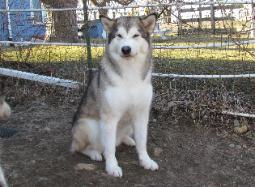

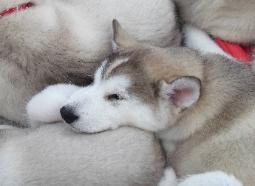

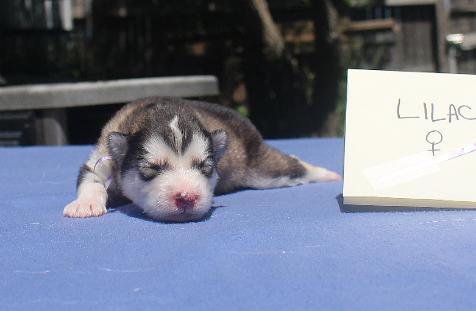
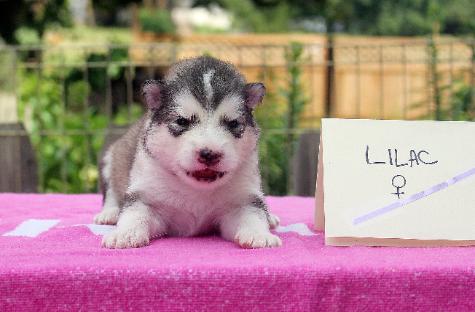
| 1 week old |
| 2 weeks old |
| Think that puppy isn't the age the seller says? Consult these photos as a guide. There can be some latitude of course but if a puppy looks MUCH different developmentally, I would be concerned. These are one female puppy through 8 weeks of age. |

| 3 weeks old |
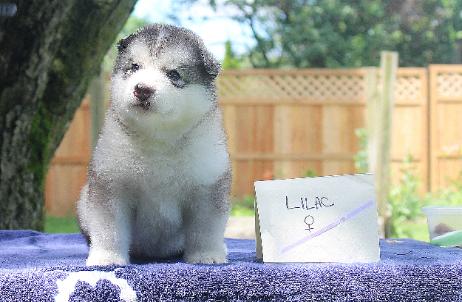
| 4 weeks old |

| 5 weeks old NOTE: not all have ears up so early. Ears can take longer and that is not wrong. |
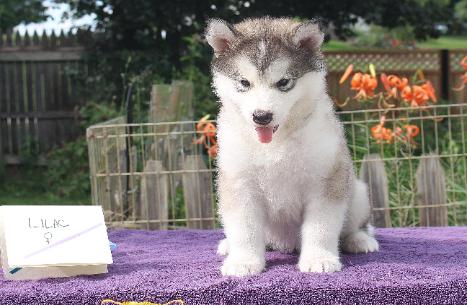
| 6 weeks old |

| 7 weeks old |
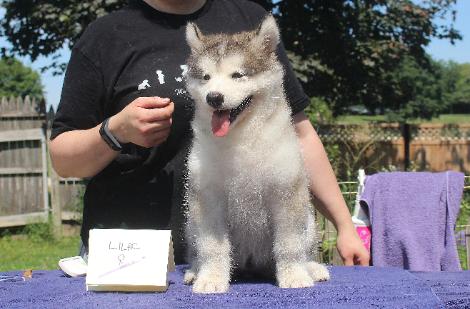
| 8 weeks old |